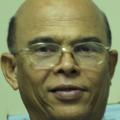He recounted that there was a big character poster at the doorway of the exhibition saying, “Only when the Tatmadaw [military] is strong, will the nation be strong.” There were many galleries in the show. Each gallery highlighted the role of the army and emphasized that it was the sole force that could defend the nation.
The show also described the junta's discrimination against the role of the democratic institutions and societies. “The final conclusion is that no one except the generals cannot control the unity of the nation including the Sovereignty," said U Win Tin.
After witnessing the show, the authorities asked U Win Tin what he thought about the exhibition and inquired his opinion and attitude toward the stratocracy. They gave him some paper and a pen and told him to write down his opinion about the show. "I wrote down my criticism. I used 25 sheets of paper. It was a blunt commentary. I made my explanation in a sense of sincerity and openness. But it irritated them severely," he told me later.
“It's the logic of the generals to consolidate militarism in Burma,” he explained to me later. ‘Their logic tells us that they are more important than the people and they used to say they are the Savior of the country that’s why they grab the sovereign power. That means they neglect the people’s desire.”
Thus he wrote: “The slogan tells us that Burma is going against a policy of peace and prosperity.” He went on to explain his understanding of the role of the army as guardian of the nation but no obligation to involve in the administrative affairs.
He said, “The real thing is that the military comes out of the womb of the people. Thus, the slogan must be like this: ‘The people are the only parents of the military.’ Anyone who does not care about his own parents is a rogue,” he pointed out to the generals.
He also emphasized that if the generals really loved peace and wanted prosperity for the nation, they needed to truthfully reflect on their limitations. The generals might want what’s best for the country, but they did not know how to handle the entire state of affairs. They are accustomed to mismanagement.
“Eventually, I came straight to the point: The army must go back to the barracks. That will make everything better in Burma,” he narrated me plainly.
The junta was very disgruntled with his criticism and accused him of advising Daw Aung San Suu Kyi to launch civil disobedient campaign in 1989. Then, they made another lawsuit against him and increased additional 11 more years jail-term.
They put him alone in his cell. The cell was 8.5 x 11.5 feet. There was only a bamboo mat on the concrete floor. Sleeping, eating, walking and cleaning the bowels were done in the very same place. He could not see the sun, the moon or the stars. He was intentionally barred from breathing fresh air, tasting nourishing food and drinking a drop of fresh water. The worst thing was throwing the old writer into solitary confinement in such a cage for two decades.
In 1994, US Congressman Bill Richardson met U Win Tin in Insein jail. Since that time he has continuously suffered from various health problems such as spondylitis, hernia, heart disease, failing eyesight, urethritis and hemorrhoids. It’s surprised to everyone of how tough this gallant journalist with so many health problems.
For the junta, U Win Tin is really a man of steel. Although they wish to defeat him, they could never do it.
U Win Tin’s case is good example for human rights violations under inhumane regime.
Article 5 of the Universal Declaration of Human Rights (UDHR) says: “No one shall be subjected to torture or to cruel, inhuman or degrading treatment or punishment.”
(Note: You can view every article as one long page if you sign up as an Advocate Member, or higher).





